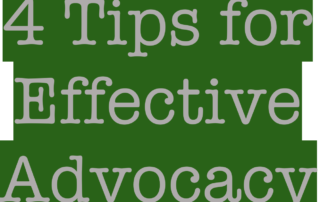**Following my recent webinar focused (ironically) on understanding ADHD, an attendee sent me a message asking for some guidance on how to be an effective advocate. After I responded, I thought maybe I would share it with everyone. This isn’t an exhaustive list, they’re just the first things that came to mind. Do Not Hide The most important place to start is to be out in the open. Talk about your ADHD in a matter-of-fact way. Share your story. You don’t have to work it into your conversation because it is your actual life. The best way to advocate is to educate. What you are educating people about is what ADHD looks like in everyday situations. Once we’ve sown the seeds of awareness, sometimes attraction is more effective than promotion. If all we ever do is advocate and educate then people won’t want to hear from us anymore. There’s an ebb and flow in this process. Everything is a teaching opportunity but not everything is a teaching moment. Find your People Join organizations that promote awareness like CADDRA, CADDAC, CHADD, etc. Follow FB pages or IG accounts that are devoted to building a sense of community within the ADHD world, not just lamenting the current conditions. […]
Taking Back Control
…nothing lasts forever (emotions, thoughts, and pandemics included).
Perspective: The Gatekeeper
Often we are hard on ourselves when we don’t need to be, particularly when it comes to how much things that have happened to us continue to affect us. We like to think that we can just let things go, move on, and get over it but that’s just not how things actually work. Our past experiences continue to affect our current perception of events unless we actively try to overcome this natural tendency. Similarly, it is very difficult for a tall building to stand straight when the foundation is crooked. The only way to straighten the building is to work on the foundation, not the 30th floor. Often, when discussing current struggles with my clients, they will remark that they feel a lot of anxiety or depressed feelings “for absolutely no reason”. This is rarely the case. It is more accurate to say that they are feeling anxiety for no known reason, or no current reason. There’s always a reason. One way that is helpful for people to unlock the true impact of the past on their present is to get them to see it from outside of themselves. No, this does not involve high doses of hallucinogenic mushrooms, […]
Fighting Back Against Negativity
Our brains are wired to look for the negative. Why is this? Stated simply, it’s about survival. Think about it: if you lived in the jungle and on your way home at the end of the day, if you didn’t stop to notice the pretty flowers, would it endanger you? No. But, if you didn’t notice the poisonous snake or the scary tiger or the cave-to-cave salesman, then you might actually be in danger. Thus, it is advantageous to our survival to keep an eye out for negative, unsafe, dangerous things. However, we don’t live in the jungle anymore and the threats to our survival aren’t quite as literal anymore. We haven’t yet gotten rid of this natural instinct however; it has just transferred to other threats, social threats. We look for signs of rejection, exclusion, not belonging, not measuring up, etc. We do so because belonging to the group equals safety. Or at least it used to; that’s another fossil from our pre-industrialized past. With the development of cities and technology, a man can actually be an island and survive. I’m not saying he will be the happiest man, but he will be alive. So, how do we overcome […]
A Control Budget: Picking Your Battles
Here’s an idea: We are all born with an instinct to resist other people’s attempts to control us. This instinct is designed to help us stay safe. To one extent or another, anytime something bad has happened in our lives, it is when we are not in control. The brain learns to associate this state of powerlessness with negative events, such as pain and danger. The greater the pain and danger associated with powerlessness, the greater the brain’s drive to avoid that state. In other words, with an awareness of the origins of this association, we can understand the reflexive statement, “you’re not the boss of me” in a whole new context. Negative events don’t just include instances of physical harm and danger, but also emotional harm and danger. To a young child, few things are as instinctively dangerous as disapproval from a caregiver or trusted loved one. Parental attempts to control, no matter how well intended, are usually rebuffed, especially as the child begins to develop a sense of self somewhere around 18 months old. This is what we refer to as the terrible twos. It’s not a coincidence that as the child learns that they can resist parental […]










Recent Comments